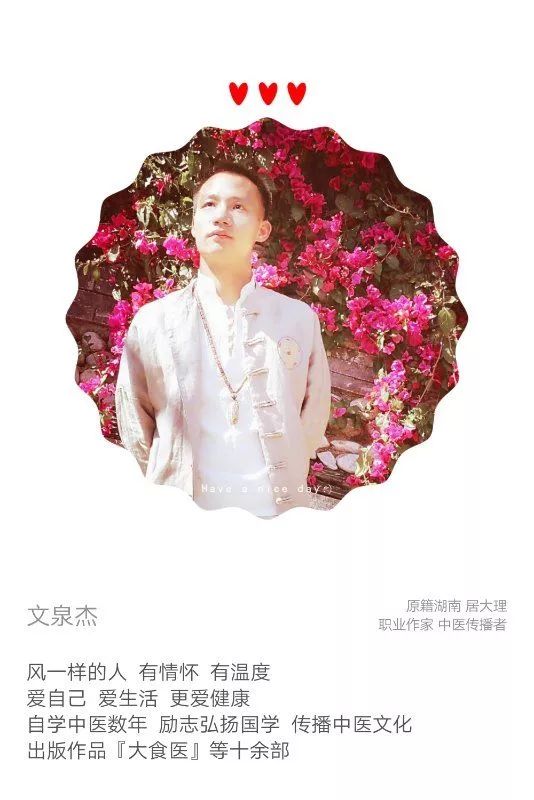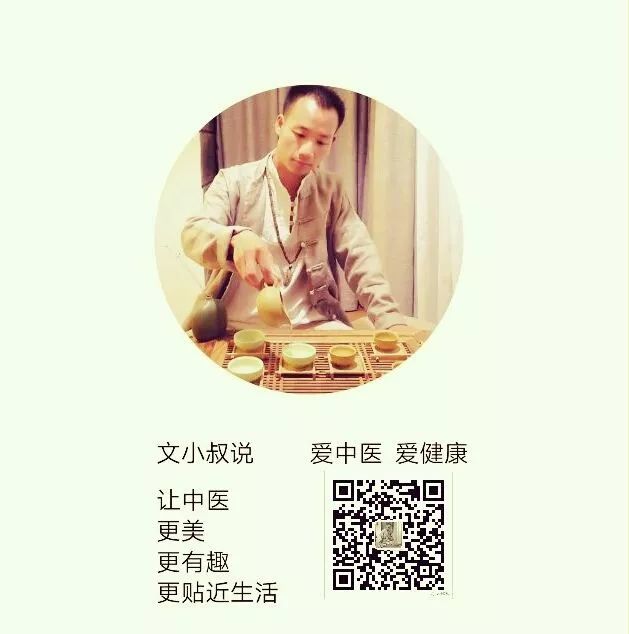Uncle Wen says Making Traditional Chinese Medicine more beautiful, interesting, and closer to life
Ms. He from Shandong, in her early forties, has been troubled by menstrual issues. She repeatedly asked Uncle Wen how to treat irregular menstruation. Initially, Uncle Wen did not respond because simply stating “irregular menstruation” does not provide a solution. What kind of irregularity is it? Is it early or late, or completely absent? Is the flow scanty or heavy, or is there amenorrhea?
Later, seeing her persistent inquiries, Uncle Wen asked her to elaborate on her condition. She immediately opened up and shared a lot.
Ms. He mentioned that her menstrual flow was very scanty, like a dripping faucet, with only a few drops each day, but it lasted a long time—over twenty days, sometimes even a month, from one menstrual period to the next. It was incredibly annoying. She even wished for amenorrhea rather than this incessant dripping. In addition to her menstrual irregularities, she also experienced headaches, feeling as if her head was heavy and wet, and she felt lethargic and disinterested in everything, even speaking felt exhausting. She had an endless amount of phlegm; eating fruit, drinking milk or yogurt, or having cake or supplements would trigger phlegm production. Importantly, Ms. He mentioned that she was overweight and had struggled with weight loss for years without success, feeling very self-conscious and thinking her life was meaningless.
Uncle Wen asked her to send a picture of her tongue. Upon seeing it, he noted it was very thick and greasy. Combining this with her description, Uncle Wen understood that all her issues were caused by phlegm-dampness. Phlegm-dampness can lead to obesity, obstruct the flow of Qi and blood, and hinder the smooth functioning of the meridians, resulting in delayed menstruation, amenorrhea, or irregular menstrual flow. Phlegm-dampness can also cause headaches, as described by Ms. He, feeling heavy as if her head was wet and not dried. Phlegm-dampness is a Yin pathogen that can lead to many negative emotions, such as Ms. He’s feelings of self-doubt and hopelessness. The presence of phlegm and a thick tongue coating are direct evidence of phlegm-dampness.
Uncle Wen reassured her, saying that while it seems she has many issues, they all stem from one cause. He recommended a formula that could not only normalize her menstruation but also help her successfully lose weight, suggesting she give it a try.
Ms. He felt as if she had grasped a lifeline. “Really? What is the formula? Please tell me, I will be grateful for life!”

Uncle Wen then recommended a well-known phlegm-resolving formula called Cangfu Daotan Wan (Cangfu Phlegm-Resolving Pill), specifically designed to address stubborn phlegm. However, based on Ms. He’s condition, Uncle Wen made some adjustments to the formula, transforming it into Cangfu Daotan Tang (Cangfu Phlegm-Resolving Decoction) with modifications:
Cang Zhu (Atractylodes)15 gramsXiang Fu (Cyperus)15 grams
Chen Pi (Dried Tangerine Peel)10 gramsBan Xia (Pinellia)10 gramsFu Ling (Poria)10 gramsGan Cao (Licorice)6 grams
Zhi Dan Nan Xing (Processed Arisaema)6 gramsZhi Ke (Bitter Orange)9 grams
Tao Ren (Peach Kernel)9 gramsHong Hua (Safflower)9 gramsDang Gui (Angelica)10 gramsHuang Qi (Astragalus)30 grams
Ms. He took the Cangfu Daotan Tang with modifications for twenty-one days. The habit of producing phlegm disappeared, her head felt clear and light, her chest was no longer tight, her menstruation returned to normal, and most importantly, she successfully lost ten pounds. Ms. He regained confidence in life and her future.
So how did this formula resolve Ms. He’s long-standing phlegm-dampness?
This formula, Cangfu Daotan Wan, uses Cang Zhu and Xiang Fu as the chief herbs, which are the soul of the formula. These two herbs represent two methods of resolving phlegm: one strengthens the spleen and dries dampness to resolve phlegm, while the other regulates Qi and promotes its flow to resolve phlegm.

First, let’s discuss Cang Zhu. Its primary function is to strengthen the spleen and dry dampness. Strengthening the spleen is the fundamental method for resolving phlegm and addressing the root cause. Uncle Wen has repeatedly emphasized in previous articles that to fundamentally resolve phlegm-dampness, one must strengthen the spleen and stomach. Only when the spleen and stomach are functioning well can phlegm-dampness be completely eradicated. There is a saying in TCM: “The spleen is the source of phlegm, and the lungs are the storage for phlegm.” For overweight individuals, Cang Zhu is essential, as its strong aroma can awaken the sluggish spleen and stomach. Cang Zhu is a savior for the overweight. If a thin person has phlegm-dampness, they should avoid Cang Zhu and can use Bai Zhu (White Atractylodes), which is milder but also strengthens the spleen. Remember, for overweight individuals, use Cang Zhu; for thin individuals, use Bai Zhu.
After strengthening the spleen, one should also nourish it, which is why Gan Cao (Licorice) is included. Cang Zhu is drying and strong, while Gan Cao is sweet and can moderate the drying nature of Cang Zhu.
Now, let’s talk about Xiang Fu. Xiang Fu regulates Qi, and regulating Qi and promoting its flow is also an important method for resolving phlegm. When Qi flows, phlegm dissipates; when Qi stagnates, phlegm-dampness worsens. Conversely, heavy phlegm-dampness can obstruct the flow of Qi, exacerbating Qi stagnation, which can lead to symptoms like chest tightness and a heavy head. Qi stagnation can also delay menstruation and cause it to be uncomfortable and irregular. Therefore, Xiang Fu is used to regulate Qi. It is a commonly used herb for Qi stagnation and is particularly effective in gynecology, as women often experience Qi stagnation.

In addition to Xiang Fu, Zhi Ke (Bitter Orange) assists in regulating Qi. Xiang Fu helps the Qi flow smoothly throughout the body, while Zhi Ke primarily ensures that Qi descends smoothly. For menstruation to occur normally, Qi must move downward. Of course, Zhi Ke also has the effect of resolving turbidity, as phlegm-dampness is one of the body’s turbid substances. Zhi Ke can help eliminate turbidity from the digestive tract, facilitating its expulsion through the large intestine. After taking Zhi Ke, one will notice an increase in gas expulsion, indicating its role in eliminating turbidity.
These are the two main methods for resolving phlegm in this formula. But are these the only methods? Certainly not. It also includes methods for eliminating dampness and resolving phlegm, as phlegm is a further condensation of dampness; dampness precedes phlegm. Here, Fu Ling (Poria) is used to eliminate dampness and resolve phlegm. Additionally, three herbs are included that directly resolve phlegm, primarily addressing the symptoms: Chen Pi, Ban Xia, and Zhi Dan Nan Xing.
Chen Pi and Ban Xia are classic combinations for resolving phlegm; they are standard components in almost all phlegm-resolving formulas, effective for any type of phlegm, whether white, yellow, or green. Zhi Dan Nan Xing can resolve phlegm while also clearing heat, considering that long-standing phlegm-stasis can generate heat, so Zhi Dan Nan Xing is used to clear phlegm-heat.

The phlegm-resolving herbs conclude here, while the following herbs were added by Uncle Wen. Why include Tao Ren (Peach Kernel) and Hong Hua (Safflower)? Because long-term illness leads to stasis. Ms. He’s long-standing phlegm-dampness has obstructed the flow of Qi and blood, resulting in blood stasis. The irregular menstrual flow is a sign of stasis and obstruction, so Tao Ren and Hong Hua are used to resolve blood stasis. Tao Ren is particularly effective for tangible blood stasis in the uterus, while Hong Hua addresses intangible blood stasis. Alternatively, San Qi powder can be used instead of Tao Ren and Hong Hua.
Why add Huang Qi (Astragalus) and Dang Gui (Angelica)? Because long-term illness leads to deficiency. Overweight individuals often experience Qi deficiency; Ms. He felt lethargic and exhausted, which are signs of Qi deficiency. This formula uses Xiang Fu and Zhi Ke to regulate Qi, but these Qi-regulating herbs can deplete righteous Qi, so Huang Qi is included to tonify Qi. Once Qi is replenished, it is also necessary to nourish blood, as women rely on blood for vitality. Menstrual issues are closely related to blood, and Dang Gui can invigorate and nourish blood while also resolving stasis. Nine out of ten women cannot do without Dang Gui, so Uncle Wen included it.
With this, the formula becomes comprehensive, primarily aimed at resolving phlegm while also nourishing Qi and blood. If you have symptoms similar to Ms. He, focusing on three main points: obesity, excessive phlegm, and scanty menstrual flow with irregularity, you can use this formula. Uncle Wen recommends taking this formula for 21 days, one dose per day.
If your phlegm-dampness is not severe but you still wish to resolve it, Uncle Wen suggests using a milder formula, Wen Dan Tang (Warm Gallbladder Decoction) for foot baths.

Special Reminder: A beautiful day begins! I hope Uncle Wen’s article brings you a good mood for the day. If you like the article, don’t forget to click the “Looking” button at the bottom right of the article or share it with your friends! The formulas shared in Uncle Wen’s articles should be taken under the guidance of a physician; any consequences are at your own risk. Due to limited energy and ability, I cannot reply to all messages; please forgive me. May you become your own divine doctor.Benefits are here!: Open the public account dialogue box and enter “irregular menstruation”, “cold”, “hair loss”, “cold hands and feet”, “stomach pain”, “liver Qi stagnation”, “injured essence”, “upper heat and lower cold”, “spleen and stomach”, “insomnia”, “eliminate dampness”, “Qi and blood”, “weight loss”, “constipation”, “diarrhea”, “kidney deficiency”, “acne”, “cough”, “rhinitis”, “cervical spine”, “depression” to obtain corresponding conditioning formulas.

